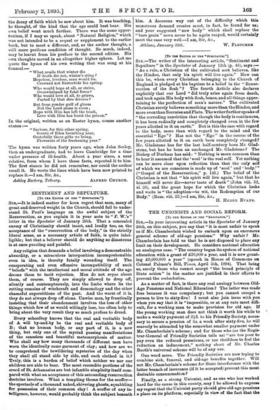SENTIMENT AND SEPULTURE.
[To TILE EDITOR OP THE 4. SPECTATOR."] ,SIR, It is indeed matter for keen regret that men, many of great and deserved weight in the Church, should fail to under- stand St. Paul's language on the awful subject of the Resurrection, as you explain it in your note to " F. W.'s " letter in the Spectator of January 26th. That a concealed enemy of Christianity should insist, and loudly too, on the acceptance of the "resurrection of the body," in the strictly literal sense, as a necessary artiele of faith, is quite intel- ligible; bat that a believer should do anything so disastrous is at once puzzling and painful.
Any religion that demands a belief involving a demonstrable absurdity, or a miraculous interposition incomprehensible even in idea, is thereby fatally wounding itself. The exasperating and even offensive incompatibility of such "beliefs" with the intellectual and moral attitude of the age dooms them to tacit rejection. Men do not argue about them, of course. They are simply allowed to drop off, silently and contemptuously, into the limbo where lie the rotting remains of witchcraft and demonology and the other shameful superstitions of the past. And the worst of it is, they do not always drop off alone. Unwise men, by frantically insisting that their abandonment involves the loss of other things which few of us would willingly lose, too often help to bring about the very result they so much profess to dread.
Every schoolboy knows that the real and veritable body of A will by-and-by be the real and veritable body of B ; that no human body, or any part of it, is a new thing, but only one of the myriad passing manifestations of the ceaseless and beautiful metamorphosis of matter. Who shall say how many thousands of different men have worn the identically same garment of clay; and how are we to comprehend the bewildering mysteries of the day when they shall all stand side by side, and each clothed in it ? Truly, this is a burden of belief which neither we nor our children are able to bear. The most recondite portions of the creed of St. Athanasins are but infantile simplicity itself com- pared with what an acceptance of this astounding resurrection doctrine involves. What a tempting theme for the scoffer— the spectacle of a thousand naked, shivering ghosts, squabbling for possession of their common clay A scoffer of any in- telligence, however, would probably think the subject beneath
him. A decorous way out of the difficulty which this monstrous demand creates must, in fact, be found for us; and your suggested "new body" which shall replace the "bare grain" sown never to be again reaped, would certainly meet the case very well.—I am, Sir, &c.,


































 Previous page
Previous page